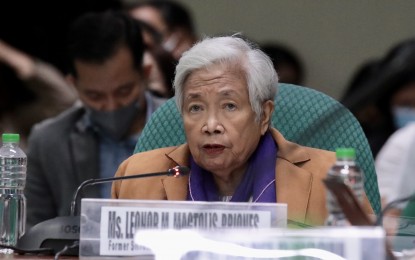
Former Education Secretary Leonor Briones (Photo courtesy of Senate PRIB)
MANILA – Former Education secretary Leonor Briones on Wednesday urged the education sector to see the Programme for International Student Assessment (PISA) 2022 results as only one of the bases in improving basic education.
Briones, who is currently the Center Director of INNOTECH, a regional center on educational innovation and technology of the Southeast Asian Ministers of Education Organization (SEAMEO), made the call as one of the resource persons in the discussion of the Senate Committee on Basic Education on the PISA 2022 results.
"We have to keep in mind that even as we worry, even as we respect the PISA standards and try to conform to OECD (Organisation for Economic Cooperation and Development) practices and standards, that we have our own development goals as well. We have our Constitution, our laws, and there is also pressure not only from various experts around this room but even from parents that perhaps, we should also include teaching children good manners and right conduct," Briones pointed out.
"We cannot separate technology. We relay mathematics and science with technology but science and technology without being human, without being humane, can be used as I've said either for good or for evil," she added.
Designed and developed by the OECD, PISA is a periodic international comparative study that tests 15-year-old students' ability to use their knowledge and skills in reading, mathematics, and science in real-world situations.
In 2022, 81 countries participated in PISA, including the Philippines, which first joined PISA in 2018 during the time of Briones as the secretary of the Department of Education (DepEd).
"What kind of learners, humans, are we trying to produce? Are we going to produce copies of OECD 15-year-olds when we know that culturally, historically, in terms of their role in the global community, are very very different?" Briones asked the panel.
Apprehensions
During her time at Deped, she said department officials had some apprehensions on whether to join PISA or not.
Briones said some of them questioned the need of presenting the rankings after the test.
"Maybe we don't believe in the validity of comparing 15-year-olds in the same manner with different histories, traumas, and political exposures all together," she said.
"The practice of ranking 15-year-olds all over the world may be politicized and result in big political questions," she added.
She cited India which did not participate in PISA in a few years now after being dissatisfied with its performance in the previous results.
"Even with the risks involved, we wanted to signal our determination to confront the challenge the quality of basic education as a country; to take the advantage of the assessment of international assessment experts; and to benchmark our performance in terms of international standards assuming that such international standards are effective and helping maintain peace, harmony, and happiness for all of humanity," Briones said.
The PISA 2022 was administered from March 2022 to May 2022 before the return of in-person classes.
Some 7,193 15-year-old students from 188 schools in 16 regions or 83 percent of the total population of 15-year-old students participated in the test.
Similar to 2018, the DepEd reported that still a large proportion of 15-year-old students or more than 75 percent in the Philippines were below the minimum level of proficiency in math, science, and reading.
In the three subject domains, the performance of 15-year-old students in the Philippines between 2018 and 2022 "remained stable" despite the Covid-19 pandemic.
To gain better PISA results in 2025, the DepEd, under its MATATAG Education Agenda, continues to implement the National Learning Recovery Program; started the implementation of the MATATAG Curriculum; plans to conduct professional development of teachers and school leaders; career progression of teachers and removed their non-teaching tasks; hiring of administrative officers; created of Learner Rights Protection Office; and lobbied for increased funds for School Feeding Program.
The DepEd will also provide strategic directions to Early Childhood Care and Development, Literacy Coordinating Council, and Teacher Education Council; strengthen teacher support; implement Catch-up Fridays; launch Digital Education; and sustain its National Learning Recovery Program. (PNA)
